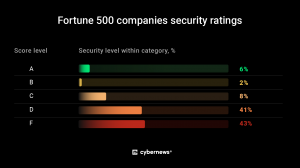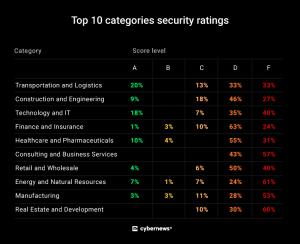87% of Fortune 500 finance and insurance companies scored a D or lower for their cybersecurity efforts
UNITED KINGDOM, January 6, 2025 /EINPresswire.com/ -- The increasing sophistication of cyberattacks and the expanding attack surface due to cloud adoption, remote work, and complex supply chains have made robust cybersecurity risk assessment more critical than ever.
Unfortunately, with the threat of cyberattacks growing, most organizations haven’t raised their security standards accordingly. Cybernews Business Digital Index shows that 84% of analyzed Fortune 500 companies scored a D or worse for their cybersecurity efforts.
Finance and insurance companies are the most vulnerable
Although the biggest U.S. companies by revenue are responsible for sensitive customer data, the results show they have major shortcomings in corporate customer data security.
According to the index, which grades businesses based on their online security measures, 84% of Fortune 500 companies scored D or worse, with 43% falling into the F category. Only 6% of analyzed organizations earned an A rating for security measures.
The biggest Fortune 500 category is Finance and Insurance, with 102 companies on the list. 63% of the scored companies received a D rating, and almost 24% received an F rating. Overall, this sector received an average security score of 71.
Finance and Insurance category companies are the most vulnerable. Only 1% of them gained an A-level security score. At the same time, as the latest events show, when Chinese Hackers accessed the U.S. treasury department, attackers are highly interested in this industry.
The situation in other industries
The second-biggest category, with 88 companies, is Manufacturing. This category's average security score is 65. According to The Business Digital Index, 81% of companies analyzed received a security rating of D or worse, with 53% falling into the F category. Only 3% of companies earned an A rating for their security measures.
61% of analyzed Energy and Natural Resources category companies worldwide scored F, and 24% got a barely passing grade of D. Only 7% of these organizations were worthy of an A rating for their security measures.
A very similar situation exists with companies in the Technology and IT category. Research shows that 75% of analyzed companies scored a D or worse for their cybersecurity efforts.
The healthcare industry is also particularly vulnerable, with 55% of the scored companies receiving a D rating and 31% an F rating. Only 10% of the companies analyzed in the Healthcare and Pharmaceuticals category achieved an A grade. Overall, the healthcare sector received an average security score of 70.
Also, 50% of the scored Retail and Wholesale category companies received a D rating and 40% an F rating. In contrast, Construction and Engineering category companies fared better, with 73% earning a D and F grade for their security.
33% of Transportation and Logistics category companies received D and F scores equally. Most (43%) of Consulting and Business services category companies were rated D, and 57% got an F. Meanwhile, Real estate and Development category companies received 30% for D and 60% for F ratings.
Researchers found nearly 671 critical or high-risk vulnerabilities
The Business Digital Index shows that the most common security issue is related to Secure Sockets Layer (SSL) configurations, with over 490 issues found in 466 analyzed companies.
Furthermore, researchers found nearly 671 critical or high-risk vulnerabilities that hackers can exploit to enter networks and steal information.
Researchers also found that analyzed Fortune 500 list companies have 254 email security issues and 480 total data breach incidents.
Unfortunately, with the threat of cyberattacks growing, most organizations haven’t raised their security standards accordingly. Cybernews Business Digital Index shows that 84% of analyzed Fortune 500 companies scored a D or worse for their cybersecurity efforts.
Finance and insurance companies are the most vulnerable
Although the biggest U.S. companies by revenue are responsible for sensitive customer data, the results show they have major shortcomings in corporate customer data security.
According to the index, which grades businesses based on their online security measures, 84% of Fortune 500 companies scored D or worse, with 43% falling into the F category. Only 6% of analyzed organizations earned an A rating for security measures.
The biggest Fortune 500 category is Finance and Insurance, with 102 companies on the list. 63% of the scored companies received a D rating, and almost 24% received an F rating. Overall, this sector received an average security score of 71.
Finance and Insurance category companies are the most vulnerable. Only 1% of them gained an A-level security score. At the same time, as the latest events show, when Chinese Hackers accessed the U.S. treasury department, attackers are highly interested in this industry.
The situation in other industries
The second-biggest category, with 88 companies, is Manufacturing. This category's average security score is 65. According to The Business Digital Index, 81% of companies analyzed received a security rating of D or worse, with 53% falling into the F category. Only 3% of companies earned an A rating for their security measures.
61% of analyzed Energy and Natural Resources category companies worldwide scored F, and 24% got a barely passing grade of D. Only 7% of these organizations were worthy of an A rating for their security measures.
A very similar situation exists with companies in the Technology and IT category. Research shows that 75% of analyzed companies scored a D or worse for their cybersecurity efforts.
The healthcare industry is also particularly vulnerable, with 55% of the scored companies receiving a D rating and 31% an F rating. Only 10% of the companies analyzed in the Healthcare and Pharmaceuticals category achieved an A grade. Overall, the healthcare sector received an average security score of 70.
Also, 50% of the scored Retail and Wholesale category companies received a D rating and 40% an F rating. In contrast, Construction and Engineering category companies fared better, with 73% earning a D and F grade for their security.
33% of Transportation and Logistics category companies received D and F scores equally. Most (43%) of Consulting and Business services category companies were rated D, and 57% got an F. Meanwhile, Real estate and Development category companies received 30% for D and 60% for F ratings.
Researchers found nearly 671 critical or high-risk vulnerabilities
The Business Digital Index shows that the most common security issue is related to Secure Sockets Layer (SSL) configurations, with over 490 issues found in 466 analyzed companies.
Furthermore, researchers found nearly 671 critical or high-risk vulnerabilities that hackers can exploit to enter networks and steal information.
Researchers also found that analyzed Fortune 500 list companies have 254 email security issues and 480 total data breach incidents.
PR team
email us here
Cybernews
Legal Disclaimer:
EIN Presswire provides this news content "as is" without warranty of any kind. We do not accept any responsibility or liability for the accuracy, content, images, videos, licenses, completeness, legality, or reliability of the information contained in this article. If you have any complaints or copyright issues related to this article, kindly contact the author above.


